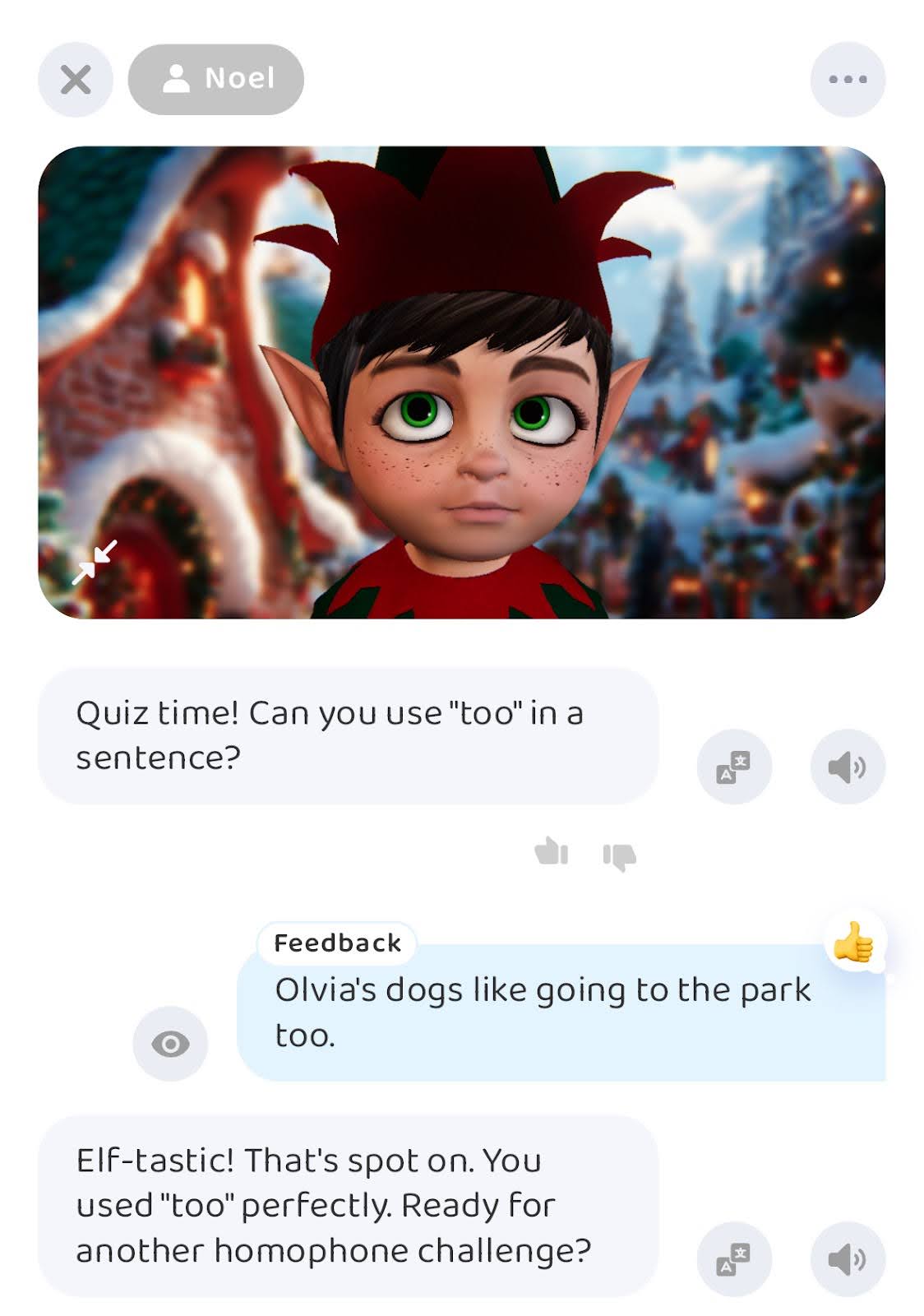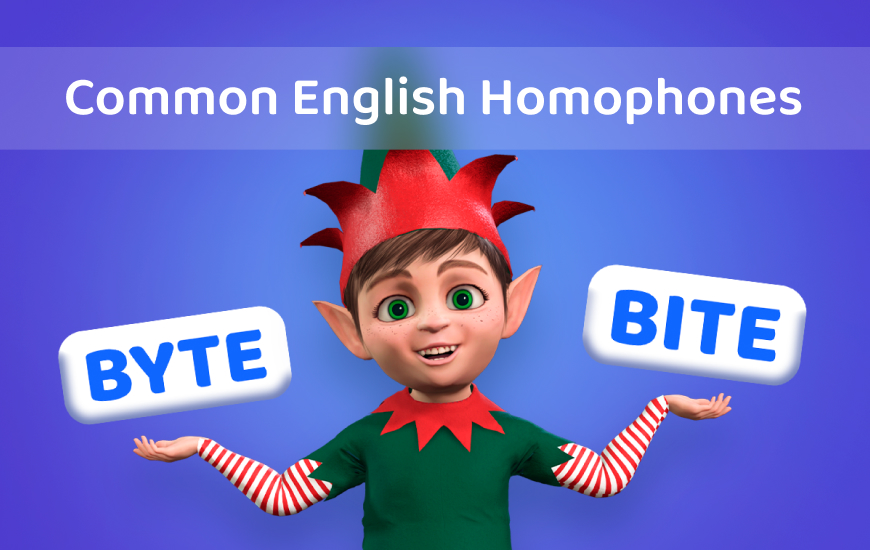Hi, my holly jolly friend! It’s me, Noel—the most festive elf in the English-learning workshop, here to help you with troublesome homophones! These words may sound the same, but trust me—they’re as different as Santa’s sleigh and a pile of reindeer snacks. Today, we’re tackling some of the most confusing ones: their, there, and they’re. If you’ve ever mixed them up (don’t worry, even native speakers do!), this guide will help you get them right every time. Let’s make your writing shine as bright as a Christmas tree!
What Are Homophones (and Why Do They Cause So Much Confusion?)
Ah, homophones. These tricky little words are the sneaky elves of the English language—they sound exactly the same but have totally different meanings. Imagine trying to guess which present is yours when every box looks the same on the outside! That’s what homophones are like.
Homophones can trip up anyone, especially in writing. Here’s why:
- They sound identical when spoken.
- They have different spellings and meanings.
- Choosing the wrong one changes the entire meaning of your sentence.
But don’t worry—once you understand the differences, you’ll never mix them up again. Let’s start with some of the most common homophones that people confuse.
Common Homophones That Cause Confusion
| Homophones | What They Mean | Example |
| Their / There / They’re | Possession / Place / They Are | The elves hung their stockings over there. / They’re excited for Christmas! |
| Your / You’re | Belonging to you / You are | Your hot cocoa smells amazing! / You’re the best elf ever! |
| Its / It’s | Possessive / It is | The reindeer wagged its tail. / It’s time to deliver presents! |
| Two / Too / To | Number / Also / Direction | I’ll take two cookies. / I love peppermint mochas too! |
💡 Elf Tip: The trick is to think about what the word actually means in the sentence. Does it show possession? Is it about a place? Or is it short for “they are”? Knowing the meaning will help you choose the right word.
For example, if you’re talking about something that belongs to someone, you’d use “their.” If you’re pointing to a location, it’s “there.” And if you mean “they are,” it’s “they’re.” Don’t stress, though. With practice (and a little holiday magic) in the Praktika AI app, you’ll master homophones in no time. Let’s break it down further!
The Big Three: “Their,” “There,” and “They’re”
Alright, let’s tackle the most confusing trio in the English language: their, there, and they’re. They sound exactly the same, but their meanings couldn’t be more different. If these words have ever made you want to throw your notebook out the window, you’re not alone! Let’s break it down with some fun examples to help you get it right every time.
1. Their = Belonging to Someone
Think of “their” as a possessive word—it shows that something belongs to a person or group.
Examples:
- The elves lost their hats during the Christmas parade.
- The reindeer are pulling their sleigh through the snow.
- The kids left their cookies out for Santa.
💡 Elf Tip: If you can replace their with “our” or “my” in the sentence and it still makes sense, you’re using the right word.
Check Yourself: “The students forgot their books.” (You could say “The students forgot our books,” so it’s correct!)
2. There = A Place or Position
Use there when you’re talking about a location or pointing something out.
Examples:
- The presents are over there under the tree.
- Look! There is Santa!
- Put the hot chocolate on the table over there.
It’s also used in phrases like:
- There are plenty of holiday decorations in the house.
- There is a gift for you on the table.
💡 Elf Tip: If you’re pointing to a spot or describing a location, use there.
Check Yourself: “The cookies are over there.” (You’re talking about a place, so it’s correct!)
3. They’re = They Are
They’re is a contraction (a shorter version) of “they are.” If you can say “they are” in your sentence, you’ve got it right.
Examples:
- They’re decorating the Christmas tree right now.
- They’re excited to see Santa Claus!
- They’re going to the holiday party tonight.
💡 Elf Tip: If you can replace “they’re” with “they are” and the sentence still makes sense, you’ve got the right word.
Check Yourself: “They’re baking gingerbread cookies.” (Replace it with “They are baking gingerbread cookies”—yep, it works!)
Ready to Practice?
Try these with your AI English tutor in the Praktika App!
- The reindeer left their / there / they’re harnesses in the barn.
- Their / There / They’re are lights all over the Christmas tree.
- Their / There / They’re going to make holiday cards tonight.
- I put the presents over their / there / they’re.
- The children forgot their / there / they’re mittens outside.
Got it? Great! Let’s keep going.
More Common Homophone Mistakes (and How to Avoid Them)
Homophones aren’t just limited to their, there, and they’re—there are plenty more that love to sneak into your writing and cause confusion. Let’s dive into some more of the most common homophone mix-ups and how to keep them straight!

1. Your vs. You’re
These two might be the most common mistake in English.
- Your = shows possession (it belongs to you).
- You’re = contraction of “you are.”
Examples:
- Your holiday sweater is adorable!
- You’re going to love this gingerbread recipe.
💡 Elf Tip: If you can replace the word with “you are,” it should be you’re. If not, use your.
2. Its vs. It’s
This one is sneaky! Even I’ve mixed them up before when writing letters to Santa.
- Its = possessive (something belongs to it).
- It’s = contraction of “it is” or “it has.”
Examples:
- The reindeer wagged its tail.
- It’s time to load the sleigh!
💡 Elf Tip: If you can say “it is” or “it has,” use it’s. If not, go with its.
3. Two vs. Too vs. To
This trio loves to cause confusion, but here’s how to keep them straight:
- Two = the number 2.
- Too = also, or more than necessary.
- To = a direction or purpose.
Examples:
- I’ll take two cups of hot cocoa, please.
- I love gingerbread cookies, too!
- Let’s go to the Christmas market.
💡 Elf Tip: If you’re talking about a number, it’s always two. If you mean “also” or “very,” use too. Otherwise, use to.
4. Wear vs. Where
These two get mixed up in writing all the time.
- Wear = to put on clothes.
- Where = a place or location.
Examples:
- I’m going to wear my cozy holiday socks today.
- Where is my Santa hat?
💡 Elf Tip: If it’s about clothing, use wear. If it’s about a location, use where.
5. Than vs. Then
- Than = used for comparisons.
- Then = used for time or sequence.
Examples:
- My Christmas tree is taller than yours.
- We’ll bake cookies, and then we’ll decorate them.
💡 Elf Tip: If you’re comparing things, use than. If you’re talking about time, use then.
Homophones can be tricky, but with a little practice with your AI English tutors and some helpful tips, you’ll avoid these common mistakes. Just remember to slow down, think about the meaning, and double-check your writing.
Quick Practice: Spot the Right Word
Time to put your new skills to the test! Let’s see if you can spot the right word in these sentences. Remember, think about the meaning behind each option—are you talking about possession (their), a place (there), or “they are” (they’re)?
Take a guess for each sentence, then check your answers in the key at the end. Ready? Let’s go!
1. Fill in the Blank:
- The elves hung up ___ stockings before bed.
(Their / There / They’re) - I put the cookies over ___ on the table.
(Their / There / They’re) - ___ going to sing Christmas carols tonight.
(Their / There / They’re) - Can you grab ___ gifts from under the tree?
(Their / There / They’re) - Look! Over ___—it’s Santa Claus!
(Their / There / They’re) - The kids forgot to take ___ mittens with them.
(Their / There / They’re) - I can’t wait to see what ___ bringing to the party!
(Their / There / They’re) - Is that your hot chocolate over ___?
(Their / There / They’re)
2. Choose the Correct Sentence:
Your vs. You’re
A. Your going to love this Christmas movie.
B. You’re going to love this Christmas movie.
Its vs. It’s
A. The reindeer wagged its tail.
B. The reindeer wagged it’s tail.
Than vs. Then
A. My gingerbread house is bigger than yours.
B. My gingerbread house is bigger then yours.
Two vs. Too vs. To
A. I’ll take to cookies, please.
B. I’ll take two cookies, please.
C. I love peppermint mochas, too!
3. Holiday Story Challenge: Fill in the Blanks!
One snowy evening, the elves were busy getting ready for Christmas. (Their / There / They’re) workshop was full of toys, and Santa’s sleigh was parked over (their / there / they’re).
“Look!” said Noel. “(Their / There / They’re) finishing the last batch of cookies!”
The elves left (their / there / they’re) coats near the fireplace and gathered around to sing carols. “I hope (their / there / they’re) ready for tomorrow!” one of them said.
Answer Key:
Fill in the Blank:
- Their
- There
- They’re
- Their
- There
- Their
- They’re
- There
Choose the Correct Sentence:
- B. You’re going to love this Christmas movie.
- A. The reindeer wagged its tail.
- A. My gingerbread house is bigger than yours.
- B. I’ll take two cookies, please. / C. I love peppermint mochas, too!
Holiday Story Challenge:
- Their workshop
- There
- They’re
- Their coats
- They’re ready
💡 Elf Tip: Don’t worry if you got a few wrong—homophones are tricky, but with practice, you’ll get them right every time! Keep practicing these sentences with me in the Praktika English learning app, and soon, you’ll never confuse their, there, or they’re again.
Homophones? Handled!
Congratulations! You’ve tackled some of the trickiest homophones in English. Mixing up words like their, there, and they’re happens to everyone, but with practice, you’ll start catching those sneaky mistakes. Take your time, think about the meaning behind the word, and come chat with me in the Praktika app. We’ll practice these homophones in fun conversations—no boring drills here!

From Noel
Noel Tinsel is your cheerful, language-loving guide to mastering English with a sprinkle of holiday magic. He’s passionate about helping learners tackle tricky topics like homophones and real-world conversations—always with warmth, humor, and a festive twist. Whether you’re preparing for a customer service role or simply want to level up your English skills, Noel will make sure every lesson feels like unwrapping a gift.
